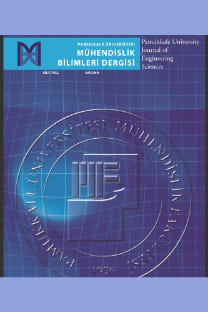Türkiye'de Nükleer Güç Santrallerine karşı halkın tutumları
Toplumsal kabul, Sinop NGS, Türkiye'de nükleer enerji politikası
Public attitudes toward nuclear power plants in Turkey
Public acceptance, Sinop NPP, nuclear energy policy in Turkey,
___
- Cravens G. Power to Save the World: The Truth About Nuclear Energy, 1nd ed. New York, USA, Knopf 2007.
- Cooper M. “Policy challenges of nuclear reactor construction: cost escalation and crowding out alternatives”. http://www.ises.org.il/assets/files/News /20100909_cooperStudy.pdf, (01.10.2018).
- Cernoch F, Zapletalova V. “Hinkley Point C: a new chance for nuclear power plant construction in central Europe?”. Energy Policy, 83, 165-168, 2015.
- Ertor-Akyazi P, Adaman F, Ozkaynak B, Zenginobuz U. “Citizens' preferences on nuclear and renewable energy sources: Evidence from Turkey”. Energy Policy, 47, 309-320, 2012.
- Ozcan M. “Citizens' opinions about nuclear power plants”. 9th International Conference on Electrical and Electronics Engineering, Bursa, Turkey 26-28 November, 2015.
- Yoo H and Lee J. “Results of Nuclear Security Culture on Personnel at Nuclear Power Plants”. Annals of Nuclear Energy, 85, 398-402, 2015.
- Zhang Q, Mclellan B C, Tezuka T, Ishihara K N. “Economic and environmental analysis of power generation expansion in Japan considering Fukishima nuclear accident using a multi-objective optimization model”. Energy, 44 (1), 986-995, 2012.
- Kessides I N. “The future of the nuclear industry reconsidered: Risks, uncertainties and continued promise”. Energy Policy, 48, 185-208, 2012.
- Ansolabehere S, Konisky D M. “Public attitudes toward construction of new power plants”. Public Opinion Quarterly, 73 (3), 566-577, 2009.
- Webber D J. “Is nuclear power just another environmental issue? An analysis of California voters”. Environment and Behavior, 14 (1), 72-83, 1982.
- Bisconti AS. “Changing public attitudes toward nuclear energy”. Progress in Nuclear Energy, 102, 103-113, 2018.
- Ozyar E. “Effects of Chernobyl Accident on Turkey.” Environmental Protection Against Radioactive Pollution, 33, 85-88, 2003.
- Akcay B. “The case of nuclear energy in Turkey: From chernobyl to Akkuyu Nuclear power plant”. Energy Sources, Part B: Economics, Planning, and Policy, 4 (4), 347-355, 2009.
- Acar H, Çakabay B, Bayrak F, Evrenkaya T. “Effects of the Chernobyl disaster on thyroid cancer incidence in Turkey after 22 Years”. ISRN Surgery, 10, 1-3, 2011.
- Gökmen I, Birgül O, Kence A, Gökmen A. “Chernobyl radioactivity in Turkish tea and its possible health consequences”. Journal of Radioanalytical and Nuclear Chemistry, 198(2), 487-497, 1995.
- T.C. Enerji ve Tabi Kaynaklar Bakanlığı. “Nükleer Santraller ve ülkemizde kurulacak nükleer santrale ilişkin bilgiler (Nuclear Power plants and detailed information to the nuclear plant to be installed in our country)”. Ankara, Turkey, 1, 2010.
- Roh S. “Big data analysis of public acceptance of nuclear power in Korea”. Nuclear Engineering and Technology, 49, 850-854, 2017.
- Greenpeace. ”Türkiye’nin %64’ü Nükleere Hayır Diyor” http://www.greenpeace.org/turkey/tr/ews/turkiyenin-yuzde-64u-nukleere-hayir-diyor 290411 (11.07.2018).
- BBC. “Nuclearenergy” http://www.globescan.com/images/images/pressreleases/bbc2011_nuclear_energy/bbc2011_energy.pdf (11.07.2018).
- KONDA. ”ClimateSurvey”. https://www.iklimhaber.org/climatesurvey2018 (11.12.2018).
- Frantal B, Maly J. “Close or renew? Factors affecting local community support for rebuilding nuclear power plants in the czech republic”. Energy Policy, 104, 134-143, 2017.
- Bird D K, Haynes K, Honert R, McAneney J, Poortinga W. “Nuclear power in Australia: A comparative analysis of public opinion regarding climate change and the Fukushima disaster”. Energy Policy, 65, 644-653, 2014.
- Yuan X, Zuo J, Ma R, Wang Y. “How would social acceptance affect nuclear power development? A study from China”. Journal of Cleaner Production, 163, 179-186, 2017.
- Kim Y, Kim W, Kim M. “An international comparative analysis of public acceptance of nuclear energy”. Energy Policy, 66, 475-483, 2014.
- Dear M. “Understanding and overcoming the NIMBY syndrome”. Journal of the American Planning Association, 58, 288-300, 1992.
- Hurriyet. “Nükleer Eğitim için Rusya'ya 600 Öğrenci Gönderilecek 600 Students Will Be Sent to Russia for Education in Nuclear Engineering”. http://www.hurriyet.com.tr/ekonomi/nukleer-egitim-icin-rusyaya-600-ogrenci-gonderilecek-20537908 (12.05.2012).
- Trend News Agency. “Turkey to Send 100 Students to Russia for Nuclear Education”. https://en.trend.az/world/turkey/2246470.html (26.02.014).
- Hurriyet Daily News. “Turkey to Send 80 Students to Russia for Nuclear Education”. http://www.hurriyetdailynews.com/turkey-to-send-80-students-to-russia-for-nuclear-education-82977 (26.05.2015).
- Milliyet, “Rusya'da Eğitim Gören ilk Türk Nükleer Mühendisleri Mezun Oluyor (The First Group of Turkish Nuclear Engineers Getting Education in Russia Are Graduating)”. http://www.milliyet.com.tr/egitim/rusyada-egitim-goren-ilk-turk-nukleer-muhendisleri-mezun-oluyor-2570445 (17.12.2017).
- ISSN: 1300-7009
- Başlangıç: 1995
- Yayıncı: PAMUKKALE ÜNİVERSİTESİ
Özge ALTUN, Şule YILDIZ, Tuba ANIK
Bir GSM operatörü için elektrik kesintisi durumunda ekip planlanma
Fadime ÜNEY YÜKSEKTEPE, Kübra ÇAKIR, Nur YILMAZ, Meltem BAYRAK
Mehmet Safa BODUR, Mustafa BAKKAL
Evrencan ÖZCAN, Tuğba DANIŞAN, Tamer EREN
Parabolik güneş kolektörlü organik rankine çevriminin enerji ve ekserji analizi
Ultrasonik titreşimin tel çekme işlemine etkisi
Onur DUMAN, Mustafa Kemal KÜLEKÇİ
Türkiye'de Nükleer Güç Santrallerine karşı halkın tutumları
Hasan OĞUL, Mehmet Onur KARAAĞAÇ
Dinamik test metodu ile bir güneş kollektörünün ısıl performansının belirlenmesi
Ahmet YILANCI, Öner ATALAY, Günnur KOÇAR, Ahmet ERYAŞAR
Et taşıma sürecinde karşılaşılan kas iskelet sistemi rahatsızlığı risklerinin incelenmesi
